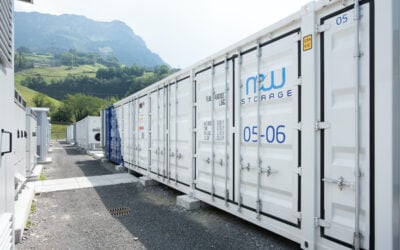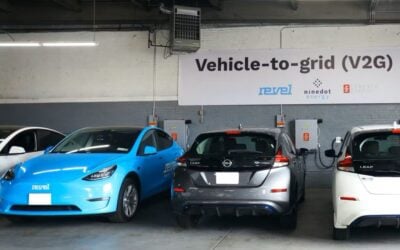
A proposed network of high speed electric vehicle chargers and large-scale batteries connected directly to the UK’s transmission network has been unveiled to offer a new business model to the country’s energy storage market.
Pivot Power, brought about by the directors of battery developer Become Energy, is proposing to connect over 2GW of lithium-ion batteries to the national electric grid while deploying rapid EV charging infrastructure in a £1.6 billion (US$2.15 billion) programme.
Enjoy 12 months of exclusive analysis
- Regular insight and analysis of the industry’s biggest developments
- In-depth interviews with the industry’s leading figures
- Annual digital subscription to the PV Tech Power journal
- Discounts on Solar Media’s portfolio of events, in-person and virtual
The company is targeting 45 sites around the country to install 50MW batteries near major roads and towns to accommodate the growth of EVs with up to 100 rapid 150kW chargers. These will be future-proofed to ensure they can support rapid 350kW chargers in coming years.
The plans, which aim to deploy at 10 sites over the next 18 months, chime with those recently put forward by Britain’s transmission system operator (TSO) National Grid’s EV lead Graeme Cooper, who told MPs that the system operator was developing plans for an EV network of 50 sites around the country to solve range anxiety.
According to chief executive Matt Allen, Pivot Power’s plans offer an alternative model to bring about an EV revolution in the UK.
“Pivot Power’s plans are completely separate but they are complementary to the proposals that have been mentioned by National Grid and Graeme [Cooper] for that network of rapid charging stations, which had been focused on their side on the motorway service station environment.
“A big key differentiator on our part in terms of the National Grid scheme is very much in the involvement of battery storage in our business model,” he said.
The ‘battery plus’ model, as it has been dubbed by Pivot Power, will see what could be the world’s largest network of transmission network-connected batteries rolled out over the next five to six years.
According to Michael Clark, chief technical officer of Pivot Power, it was developed in response to the diminishing returns available in frequency markets as a result over over-saturation; an issue which should be overcome by playing in the transmission network space for the first time.
“Fundamentally we’re describing this as battery plus because we’re going up the transmission system; a whole other voltage level and size of network so it’s less about smoothing power because we have access to lots of power, its more in managing the costs that the batteries will play their part,” he said.
“The [revenue stack] will not be uncommon it’s just the scale that we’re doing it at. We’ll be looking for ancillary market contracts, be that from frequency response or capacity market, but due to the access to the transmission network we’ll be looking at a much more trading heavy model with ahead and intra-day balancing mechanism available to us right from the start for each commissioned project.






